Physical Address
304 North Cardinal St.
Dorchester Center, MA 02124
Physical Address
304 North Cardinal St.
Dorchester Center, MA 02124
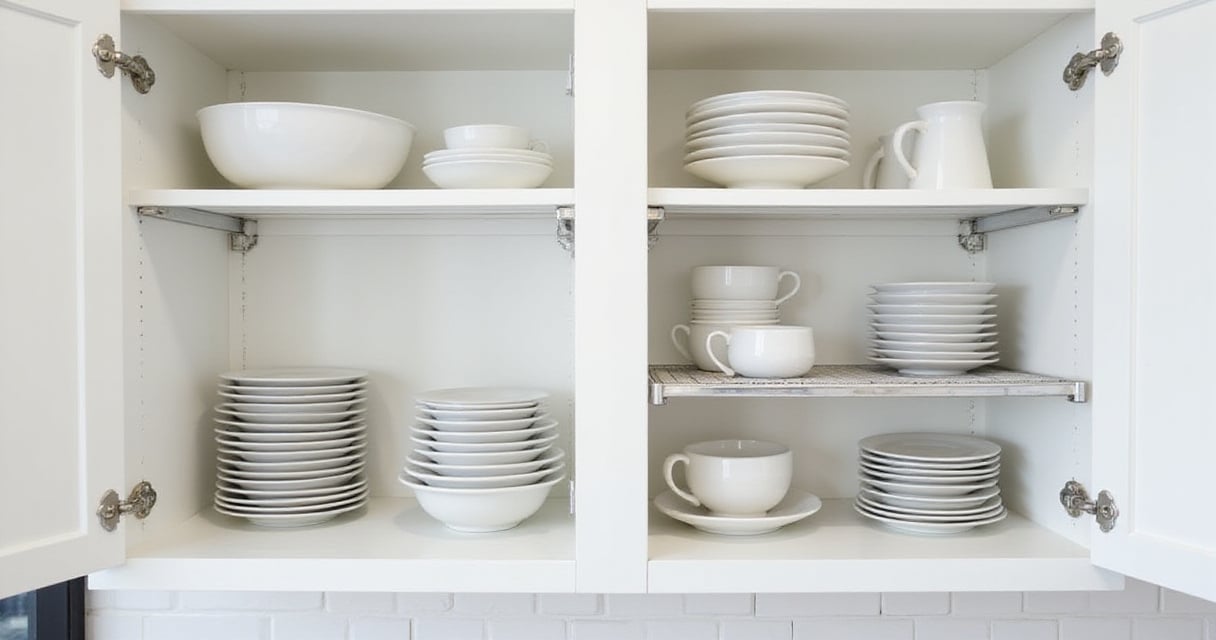
Discover 19 innovative kitchen cabinet storage solutions to transform chaotic cabinets into organized spaces. Learn expert tips for maximizing space and creating a mindful cooking environment.
Is your kitchen cabinet a black hole where good intentions and Tupperware go to disappear? Do you find yourself battling an avalanche of pots and pans every time you try to cook? You’re not alone! Kitchen cabinet storage is a universal struggle.
But what if we could transform these chaotic spaces into mindful sanctuaries that support your cooking practice? As someone who designs meditation spaces for a living, I’ve discovered that the principles of sacred space design apply perfectly to kitchen organization. When your cabinets are thoughtfully arranged, cooking becomes a more peaceful, present experience.
Most kitchen cabinets have significant unused vertical gaps between shelves. This inefficiency leads to items piled haphazardly, making it a treasure hunt to find what you need. Shelf risers are the simple yet brilliant solution to this problem.
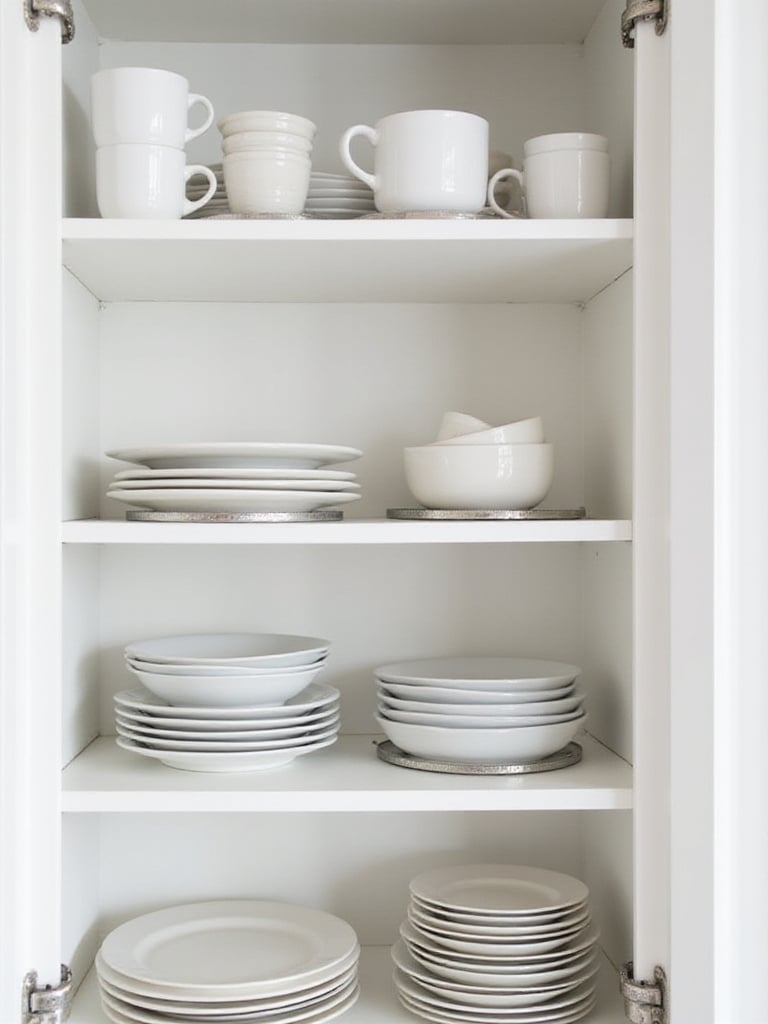
Shelf risers effectively double or even triple the usable storage space within the same cabinet footprint by creating tiered levels. They’re particularly effective for organizing dishes, canned goods, spices, and baking supplies. Before purchasing, measure your cabinet dimensions carefully to ensure proper fit.
The heart of the matter is finding the right material for your needs – wire risers offer airflow, metal provides durability, plastic is easy to clean, and wood adds warmth and style.
Corner cabinets: the Bermuda Triangles of the kitchen. Items vanish into their depths, never to be seen again until a major kitchen clean-out. But fear not, the Lazy Susan is here to rescue you from the abyss!
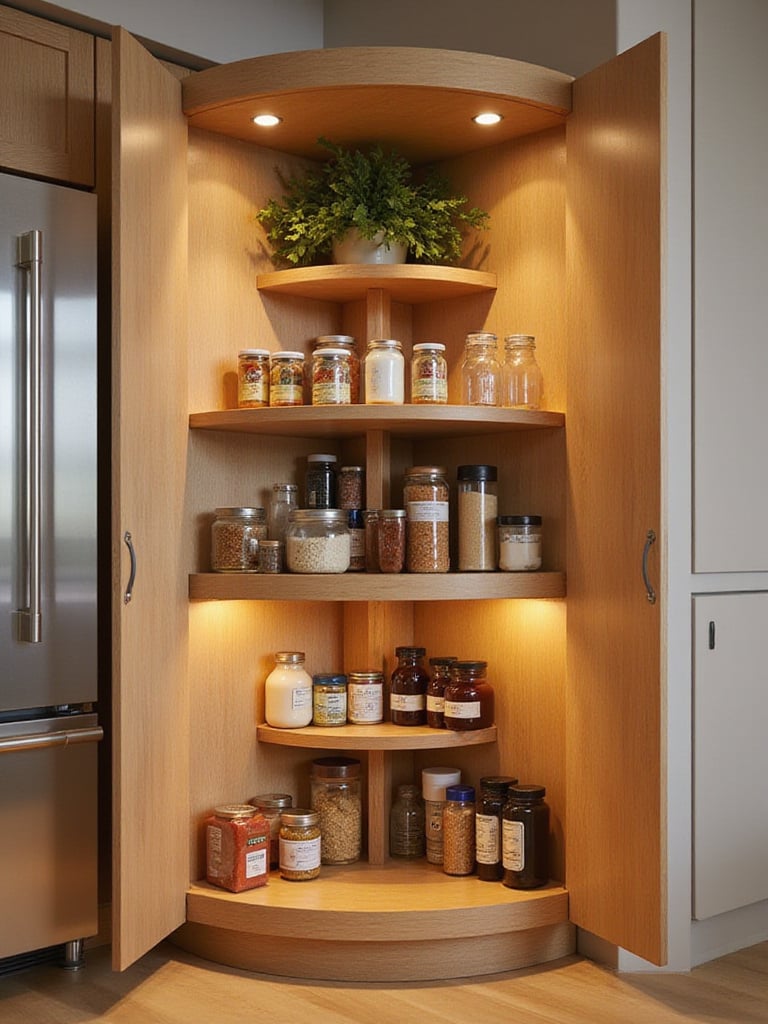
Lazy Susans transform previously inaccessible areas into easily reachable storage. With a simple spin, everything comes to the front. This not only improves organization but also significantly reduces food waste by preventing items from being forgotten and expiring at the back.
What’s fascinating is that Lazy Susans come in several styles – full-circle, kidney-shaped, pie-cut, and D-shaped – each designed for specific corner cabinet configurations. The best choice depends on your cabinet shape and what you’ll be storing.
Open your utensil drawer. What do you see? A jumble of spoons, forks, whisks, and who-knows-what-else? Drawer dividers are the superheroes of kitchen organization, stepping in to bring order to utensil and gadget chaos.
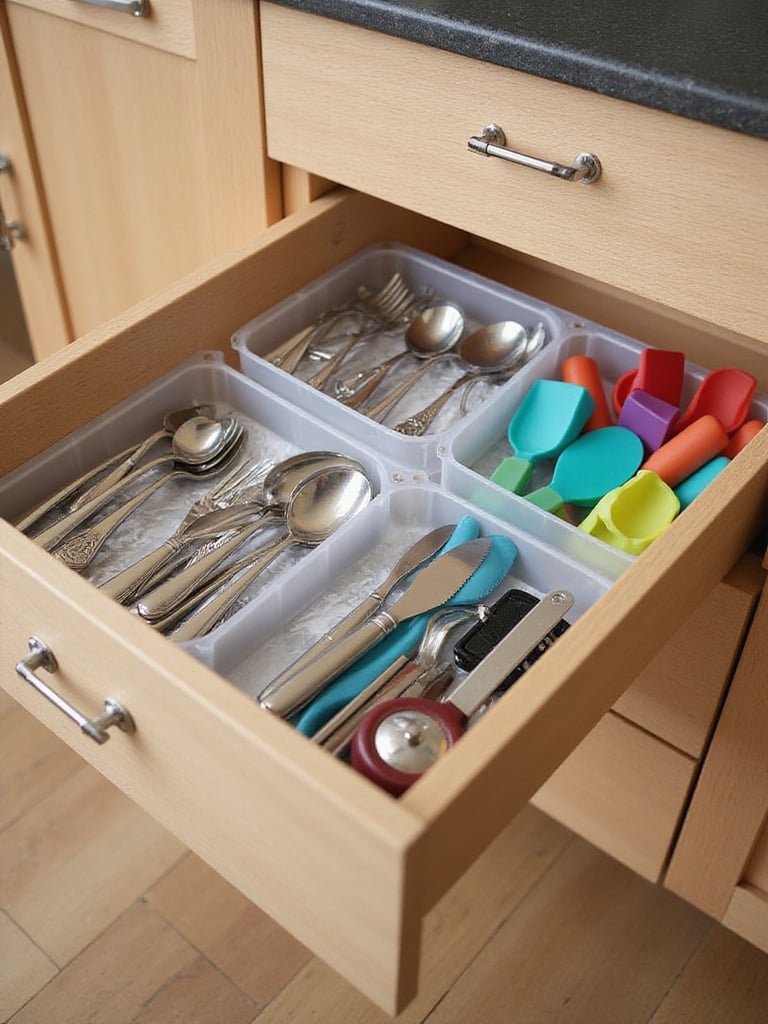
Drawer dividers create defined spaces within drawers, preventing items from becoming a tangled mess. They allow you to categorize and compartmentalize everything, making it incredibly easy to find exactly what you need. Beyond tidiness, they maximize vertical drawer space, ensuring nothing gets buried at the bottom.
Here’s where it gets interesting: drawer dividers come in many forms – adjustable, fixed, custom-built, modular, and honeycomb. Each serves a slightly different purpose, allowing you to create a system that perfectly matches your needs and the energy flow of your kitchen.
Deep kitchen cabinets: cavernous spaces where items disappear into the darkness, only to be rediscovered years later. Pull-out shelves are the light in that darkness, transforming these challenging cabinets into accessible storage powerhouses.
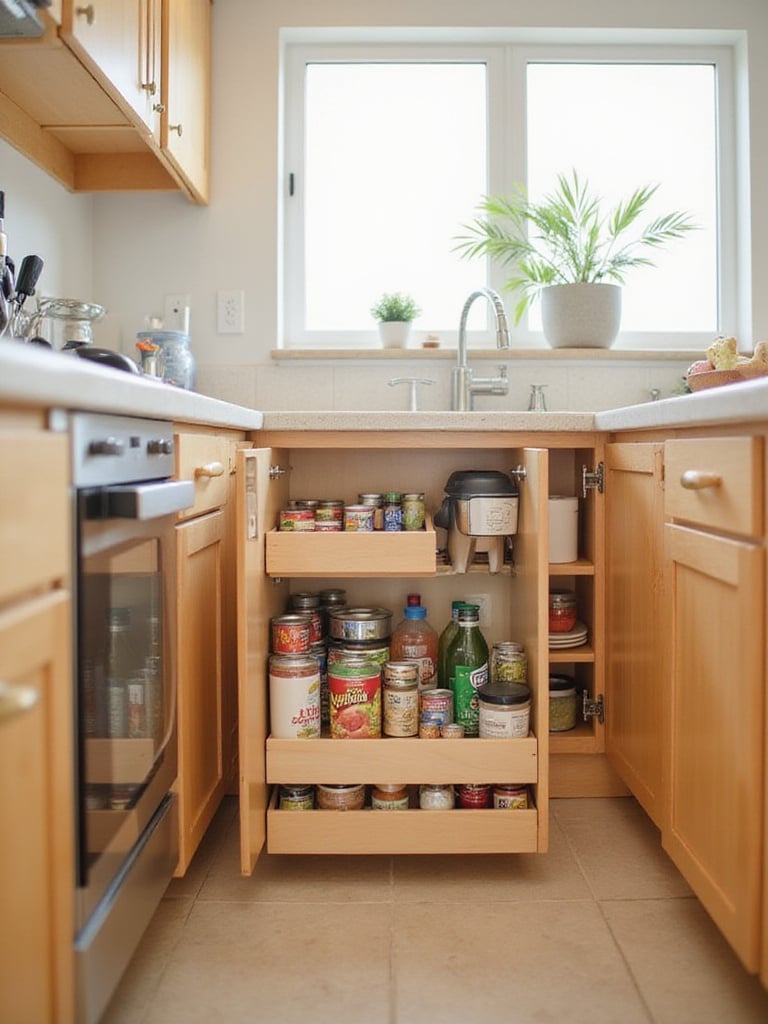
The most significant advantage is dramatically improved accessibility. Pull-out shelves eliminate the need to strain and reach into the back of deep cabinets, bringing items directly to you. This makes it easier to see and retrieve everything, leading to better organization and less food waste.
The missing piece is proper measurement before installation. Measure the inside width, depth, and height of your cabinet opening, and choose shelves slightly smaller than your measurements for smooth gliding. Consider the height of items you’ll store for vertical clearance.
The under-sink cabinet: often a dark, damp, and disorganized abyss filled with cleaning supplies and mystery drips. Its awkward shape, plumbing obstructions, and potential for moisture make it challenging to organize effectively.
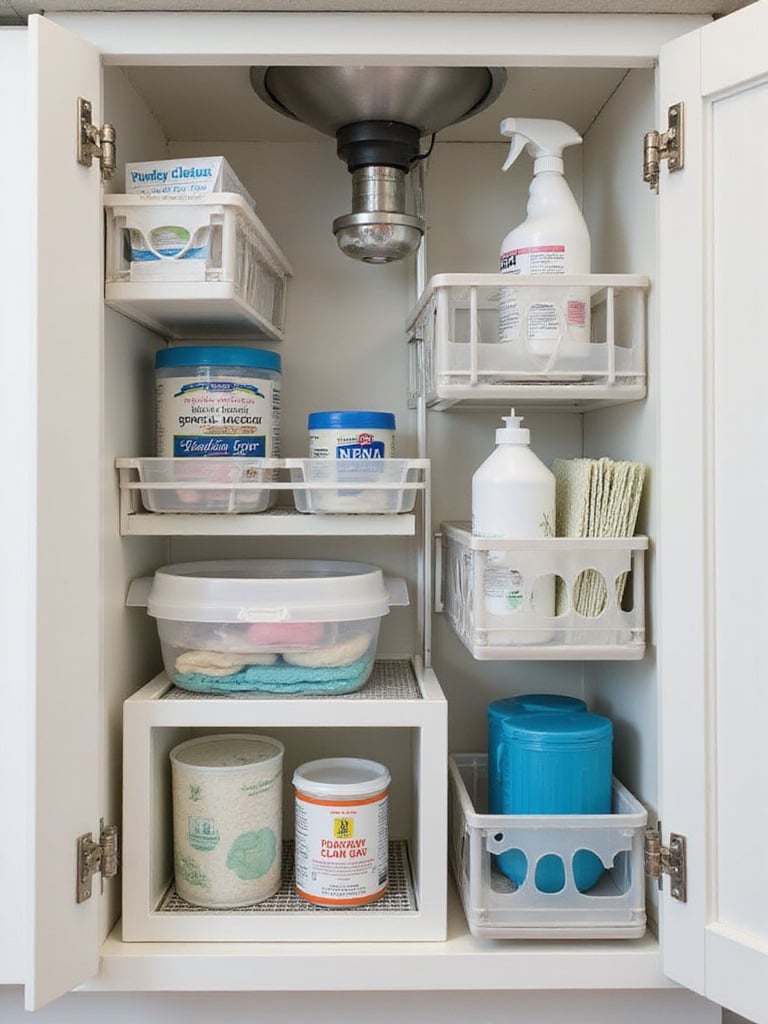
Under-sink organizers maximize usable space, prevent items from toppling over, and provide easy access to cleaning supplies. They also contain spills, protect the cabinet floor, and promote airflow, helping prevent mold – creating a more balanced energy in this often neglected space.
“The space beneath your sink holds tremendous potential. When organized mindfully, it transforms from a source of frustration to a place of calm functionality.”
Cabinet doors are often blank canvases of untapped storage potential. Door-mounted racks are the ingenious solution, instantly doubling your kitchen cabinet storage by utilizing these hidden gems.
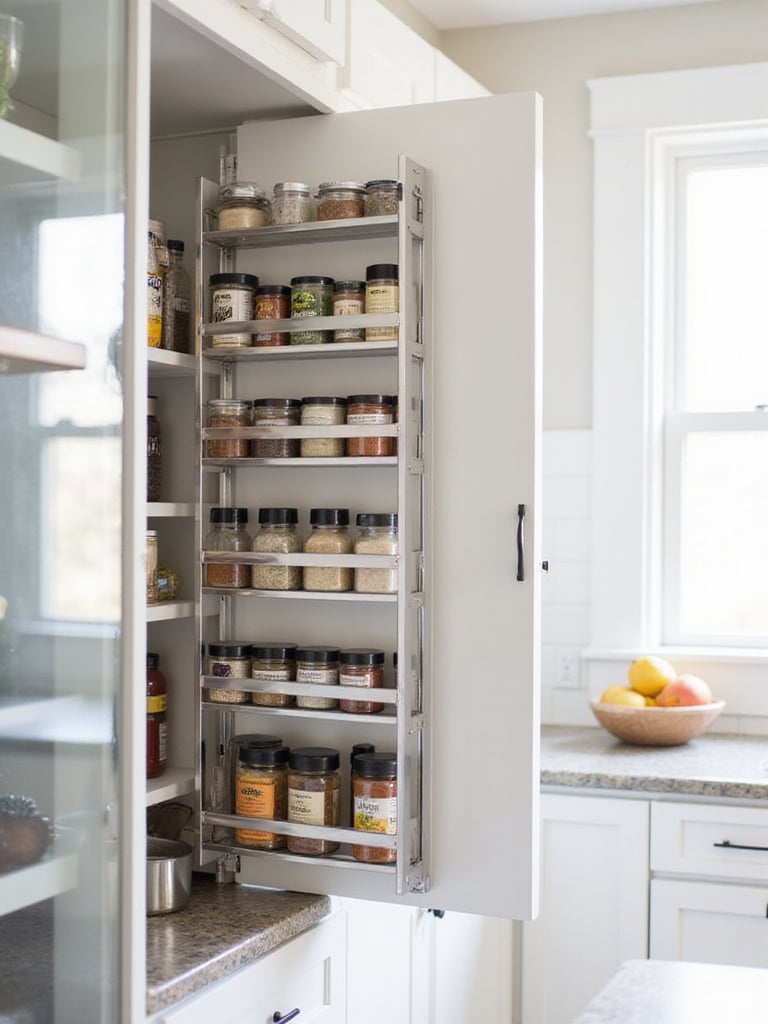
They excel at storing lightweight, frequently used items like spice jars, cleaning supplies, wraps, cutting boards, and pot lids. The beauty of door-mounted racks is their ease of installation – many come with pre-drilled holes and screws for simple installation, while some even offer tool-free over-the-door hanging options.
My discovery began when I realized that door-mounted storage creates a sense of rhythm and flow in the kitchen – everything has its place, and that place is perfectly aligned with how you move through your cooking space.
A chaotic spice cabinet is a cook’s worst nightmare. Digging through a jumbled mess of jars can derail dinner plans and dampen culinary inspiration. Spice racks transform spice chaos into organized flavor palettes, ready to unleash your inner chef.
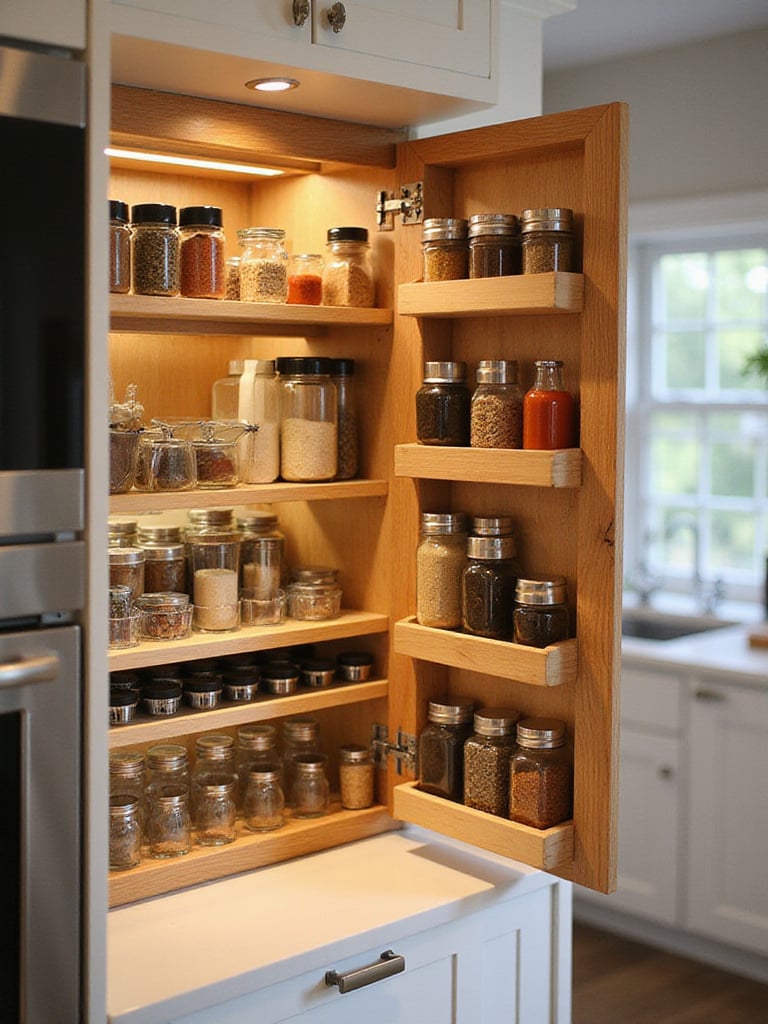
Organized spices save precious time and reduce cooking frustration. When spices are visible and easily accessible, you can quickly find what you need, allowing you to focus on the joy of cooking and experimenting with flavors. Beyond efficiency, spice organization helps you avoid buying duplicates and ensures you use spices before they lose their potency.
Things took an interesting turn when I discovered these common spice rack mistakes:
The clatter and clang of pots and pans is a familiar kitchen symphony, often accompanied by the frustration of digging for the right lid or wrestling out a pan from a precarious stack. Pot and pan organizers bring harmony to cookware chaos and end the stacking struggle for good.
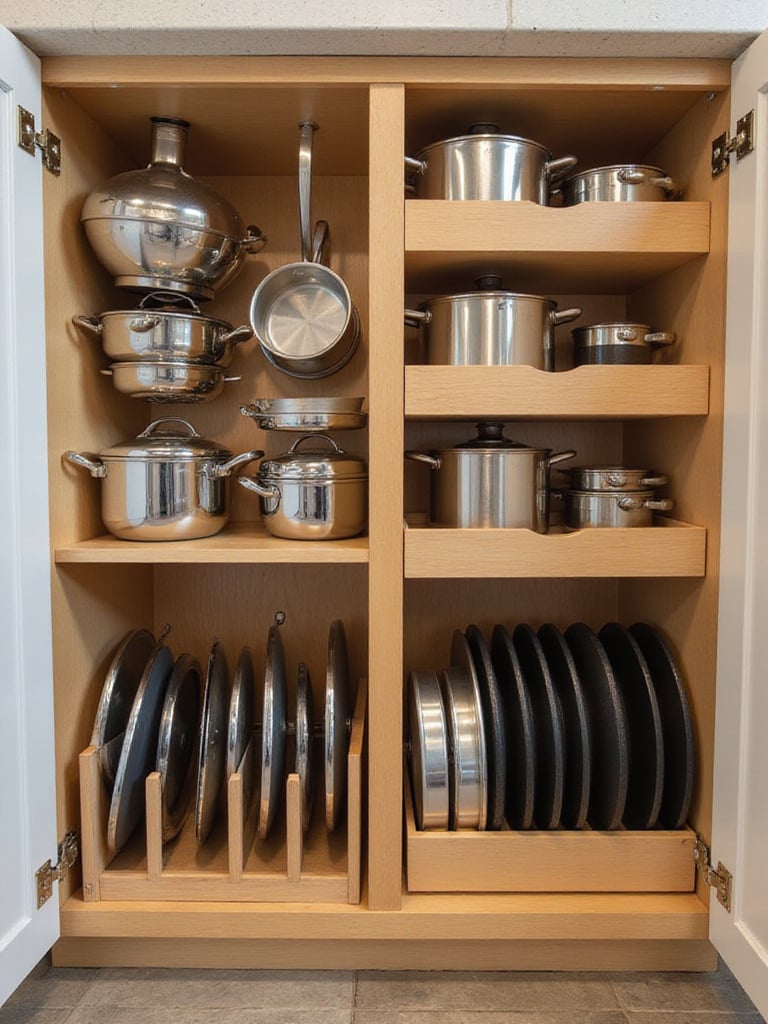
They eliminate chaotic stacking, preventing damage to your cookware and wasted space. By storing each item individually, organizers maximize space and protect pots and pans from scratches and dents. From pull-out organizers to vertical dividers, hanging pot racks to adjustable organizers, there’s a solution for every kitchen cabinet storage need.
You might be wondering about weight considerations – and you’d be right to do so. Always consider the weight of your cookware when choosing a pot rack or pull-out organizer to ensure it can handle the load without straining your cabinets.
Opening a cabinet to retrieve a plate can sometimes feel like playing a game of Jenga – one wrong move and the whole stack could come tumbling down. Plate racks are the solution to this precarious balancing act, stacking dishes neatly and preventing those dreaded cabinet avalanches.
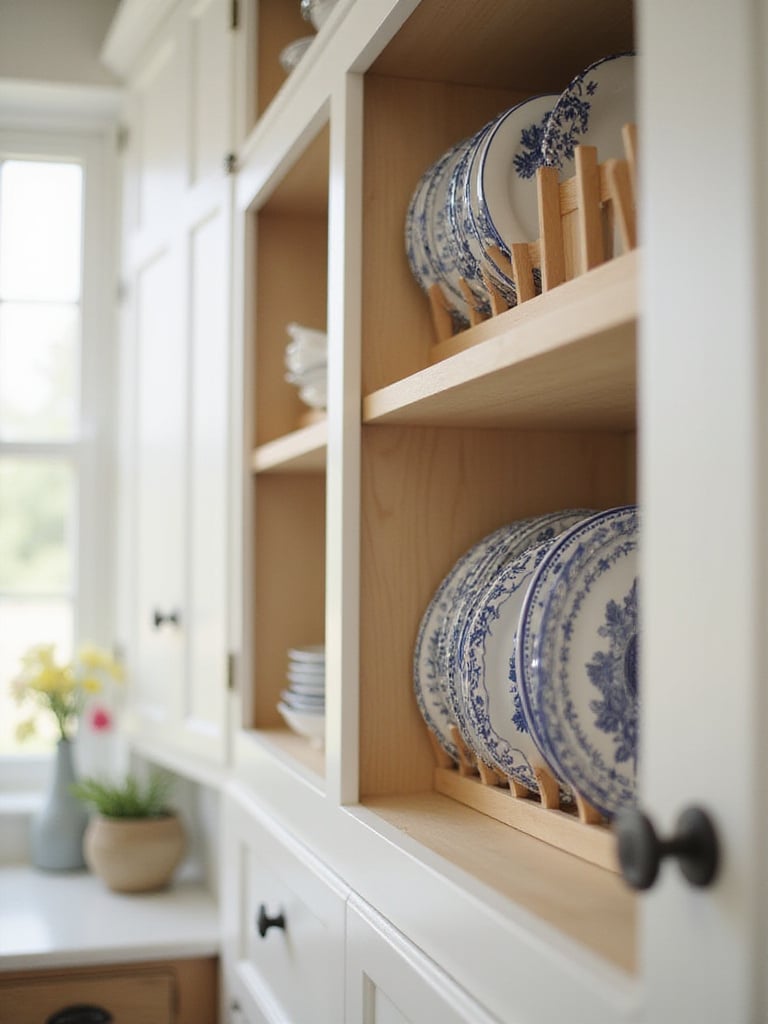
Plate racks maximize vertical cabinet space by allowing you to stack plates vertically instead of horizontally. This improves visibility and access, prevents shifting and breakage, and eliminates the “cabinet avalanche” scenario. Wire racks, wooden racks, adjustable racks, stackable racks, corner plate racks, and pull-out plate racks each offer unique benefits.
Picture it this way: a well-organized plate rack creates a sense of order and calm in your kitchen cabinet storage. Each plate has its place, making both retrieval and replacement a mindful, peaceful act rather than a stressful one.
A disorganized pantry is a recipe for food waste and kitchen frustration. Items disappear into the depths, expiration dates are missed, and duplicate purchases become the norm. Pantry organization is not just about aesthetics; it’s a crucial step in reducing food waste and creating a more efficient kitchen.
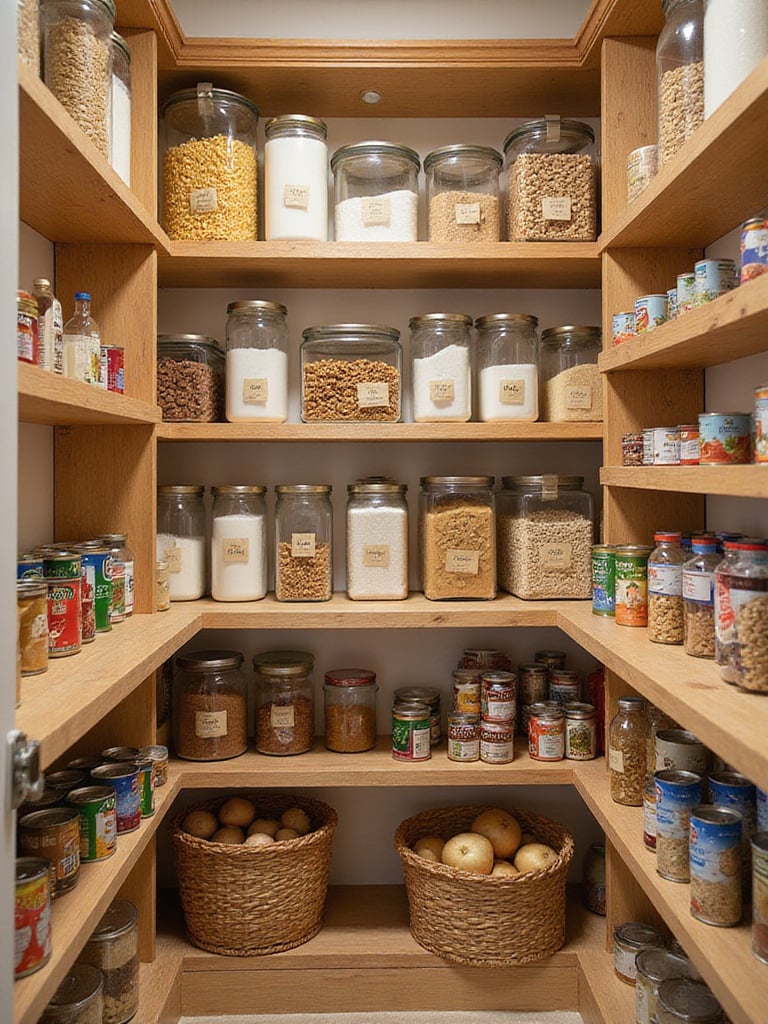
A well-organized pantry allows you to see everything you have, preventing items from being forgotten and expiring. Clear visibility helps you use ingredients in time, plan meals based on stock, and avoid buying duplicates. Prioritize vertical space with risers and adjustable shelving, use clear containers for dry goods, and group similar items together.
Let me paint you a picture of common pantry organization mistakes:
Clear containers are more than just aesthetically pleasing; they are the secret weapon for achieving a truly functional and visually appealing pantry. They provide instant visibility, saving time and preventing double-purchasing. They encourage organization, as messiness is immediately obvious, and they create a sense of order.
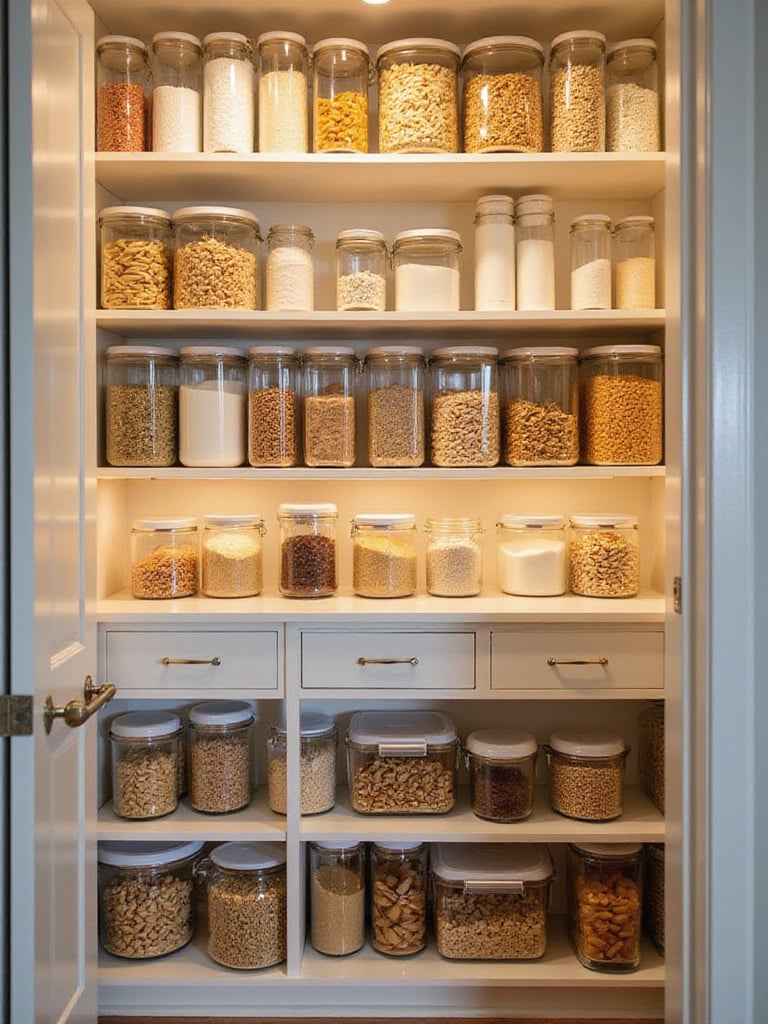
Dry goods like grains, flours, pasta, beans, nuts, snacks, sugar, coffee, tea, and spices are ideal for clear container storage. When choosing containers, consider material (glass, acrylic, or BPA-free plastic), size variety, and labeling options. Each material has its benefits – glass is durable but heavier, acrylic is lightweight but scratches easier, and plastic is affordable but choose BPA-free options.
The breakthrough came when I realized that clear containers create a sense of calm in the kitchen. The visual harmony of matching containers, neatly labeled and thoughtfully arranged, transforms kitchen cabinet storage from purely functional to spiritually uplifting.
You’ve decluttered, organized, and used clear containers – fantastic! But to truly maintain kitchen order in the long run, there’s one golden rule: label everything. Labeling eliminates guesswork, reduces food waste, and makes it easy for everyone to find what they need.
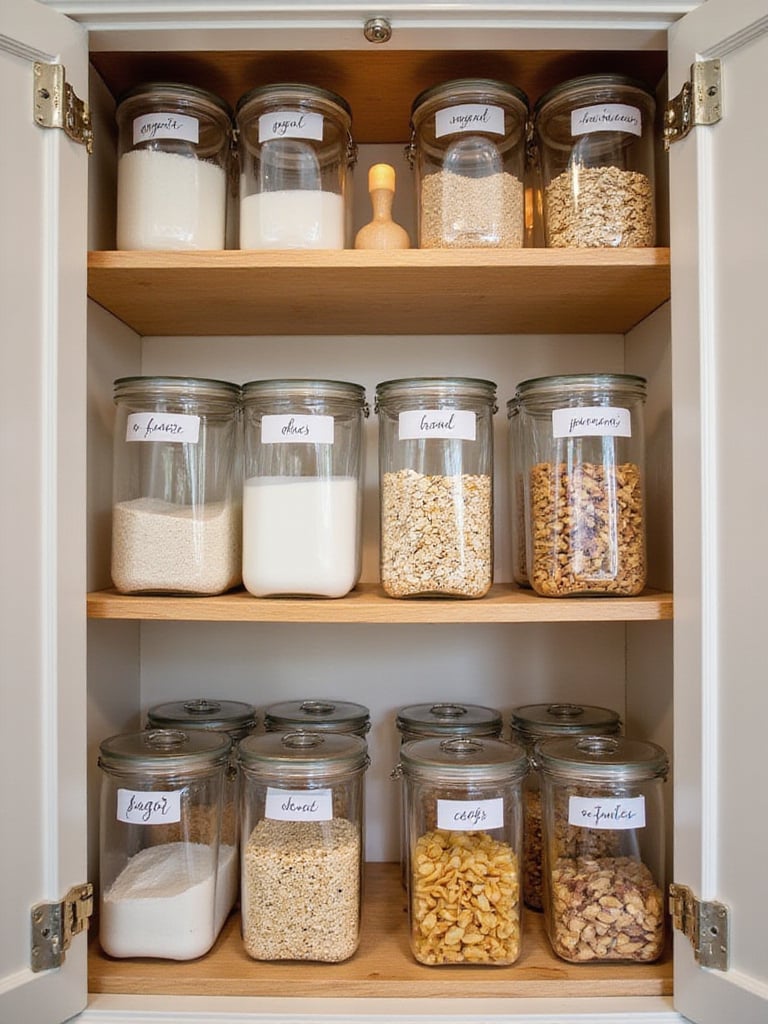
Memory fades, and labels provide a consistent reminder of contents, ensuring your organizational system remains effective. It also prevents ingredient mix-ups and helps those with allergies or dietary restrictions. Waterproof labels, chalkboard labels, printable labels, label makers, and clear labels each offer unique benefits for different kitchen cabinet storage needs.
Here’s the catch: before labeling, thoroughly clean and dry the containers to ensure the labels adhere properly. Use clear, concise language and consider including the date opened or expiration date when relevant.
Imagine trying to organize a closet overflowing with clothes you haven’t worn in years. It’s a recipe for frustration, and the same applies to kitchen cabinets. Decluttering ruthlessly is the essential first step before any organizing can truly be effective.
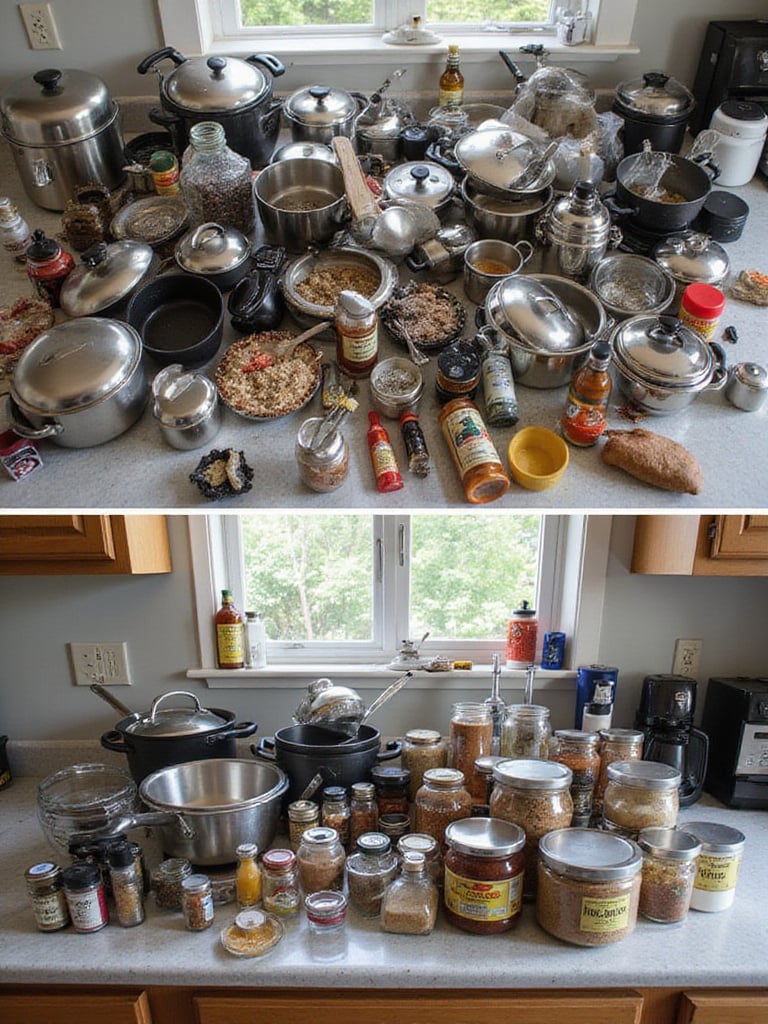
Trying to organize without decluttering is like trying to fit a size 10 foot into a size 8 shoe – it simply won’t work! Clutter obscures usable space, hides items you already own, and makes finding what you need difficult. Decluttering creates a blank slate, allowing you to assess your storage needs and design an efficient system.
The game-changer happened as I realized that decluttering is actually a spiritual practice. By releasing what no longer serves us in our kitchen cabinet storage, we create space – both physically and energetically – for what truly matters in our cooking practice.
Imagine a chef’s kitchen – everything is meticulously placed for maximum efficiency. You can bring that same level of workflow efficiency to your home kitchen by planning your zones. Kitchen zones are designated areas for specific tasks like cooking, prepping, cleaning, and storage.
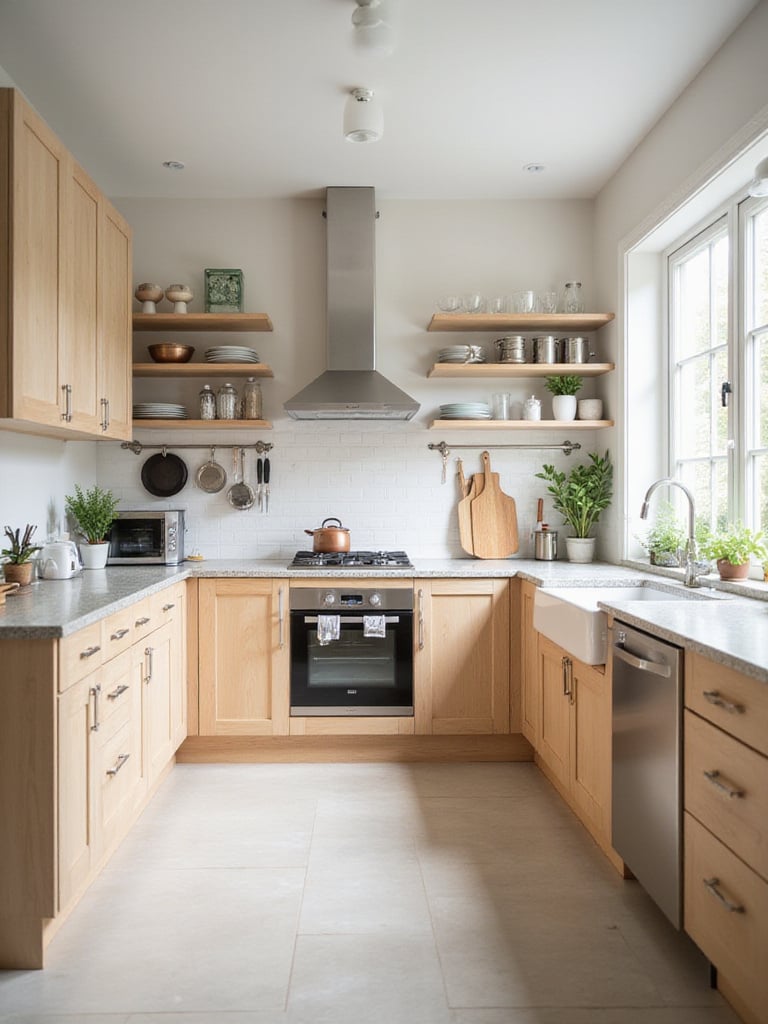
Organizing kitchen cabinet storage based on zones improves workflow, reduces cooking time, and makes meal prep more enjoyable. Common zones include prep, cooking, cleaning, baking, pantry, and serving zones. Tailor zones to your cooking habits and kitchen layout, considering the work triangle (sink, stove, refrigerator).
Let’s unpack this: zone planning is about energy conservation – both yours and the kitchen’s. When items are stored near where they’re used, cooking becomes a dance rather than a marathon, creating a more mindful, present cooking experience.
We’ve explored shelf risers for vertical space between shelves, but don’t forget the vertical surfaces inside your cabinets – the doors and walls! Hooks and rails are ingenious for utilizing this often-overlooked space, adding another layer of organization to your kitchen cabinet storage.
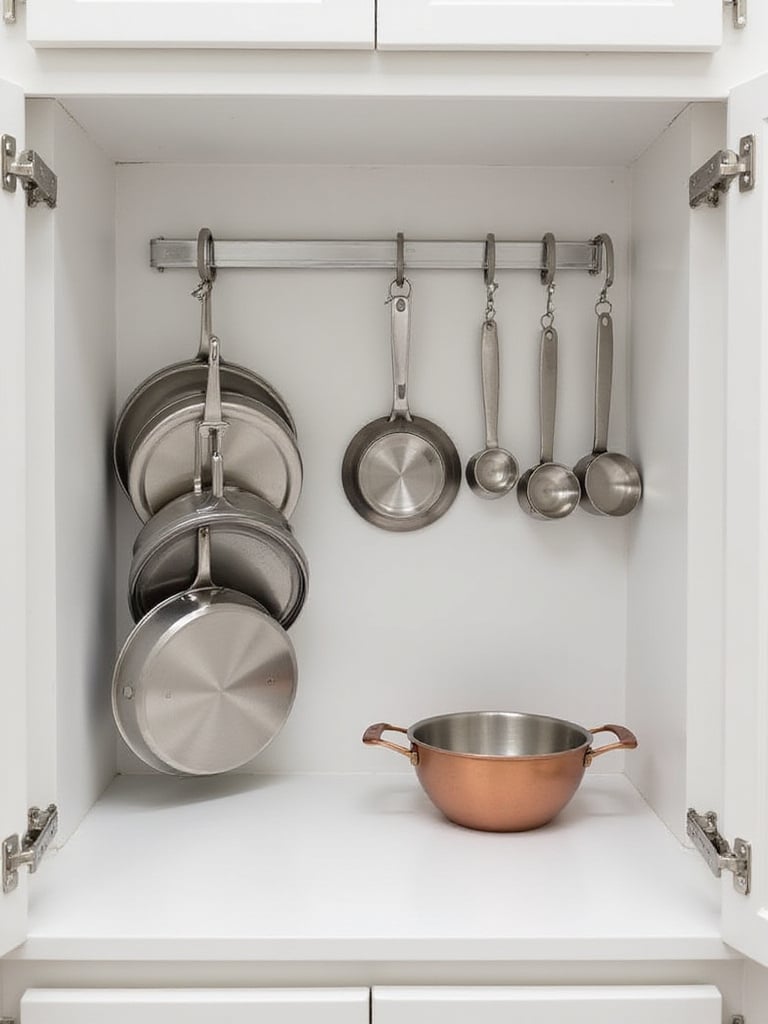
Lightweight and frequently used items like measuring cups, utensils, pot lids, and cleaning supplies are ideal for hanging inside cabinets. Options include over-the-door hooks, adhesive hooks, screw-in hooks, magnetic knife strips, and small tension rods. Consider weight capacity, use appropriate hardware, and ensure proper installation to prevent damage.
Do you see how huge that is? Using the inside of cabinet doors for storage can increase your overall kitchen cabinet storage capacity by up to 20%! That’s space you already have but probably aren’t using to its full potential.
Similar to door-mounted racks, over-cabinet door organizers offer another layer of hidden storage, hanging right over your cabinet doors. These organizers hang on the inside of cabinet doors and are used for storing cleaning supplies, kitchen wraps, spices, small jars, and even cutting boards.
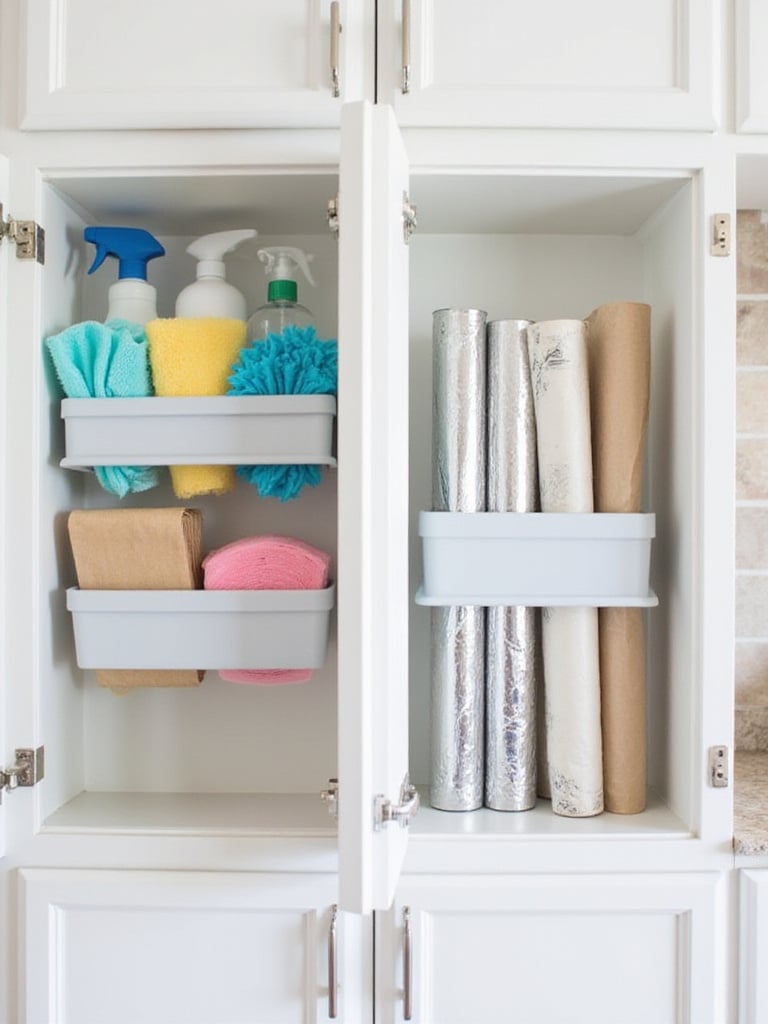
They maximize door space, improve organization, are easy to install, and are budget-friendly. However, they can reduce interior cabinet space, might prevent doors from closing if overloaded, and heavy items could damage hinges. Before buying, measure the width and depth of the cabinet door to ensure the organizer will fit properly.
It works something like this: the organizer slips over the top of your cabinet door, instantly creating storage where there was none before. No tools, no installation – just immediate kitchen cabinet storage solutions that make your life easier.
Pre-made organizers are convenient, but they can also be costly, and might not perfectly fit your specific needs. DIY cabinet organizers offer a fantastic alternative, allowing you to get creative, save money, and customize storage to your exact specifications.
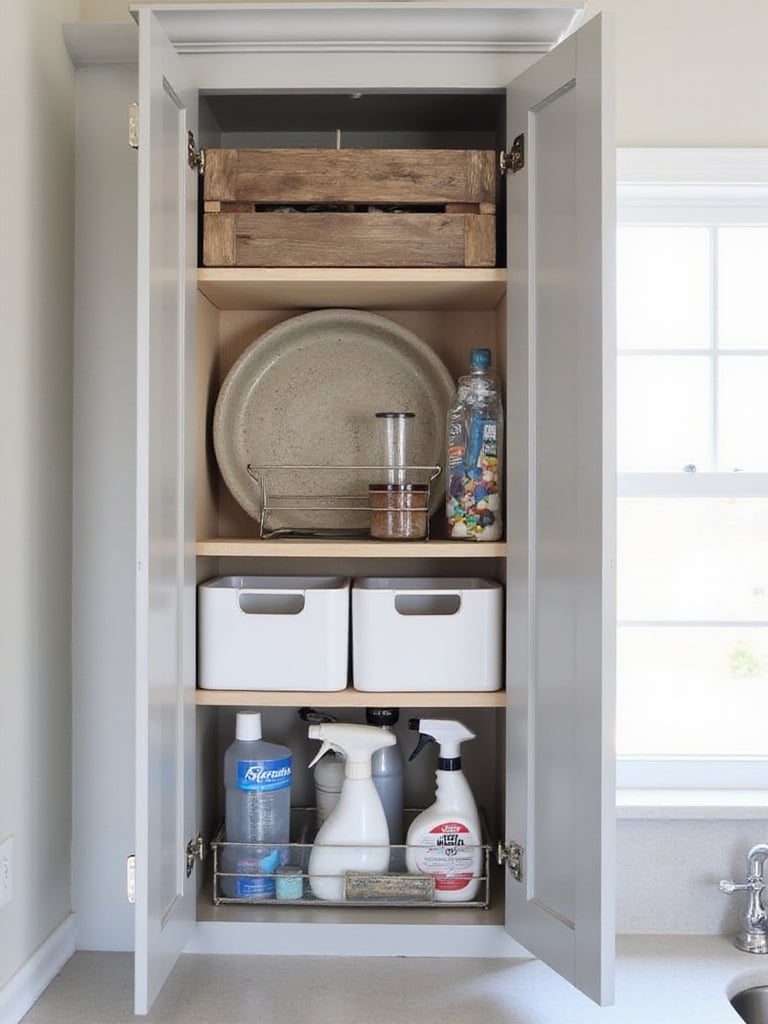
DIY organizers save money, offer complete customization, and allow you to repurpose materials, promoting sustainability. Reclaimed wood, cardboard boxes, plastic containers, wire shelving, PVC pipes, tension rods, and fabric scraps are all great options. Don’t underestimate paint or decorative tape to enhance the look.
My experience went like this: creating my own kitchen cabinet storage solutions connected me more deeply to my kitchen space. There’s something profoundly satisfying about crafting organizers that perfectly fit both your cabinets and your cooking style – it’s a form of mindfulness practice that yields practical results.
While DIY organizers are budget-friendly and customizable, investing in quality, pre-made organizers is a smart choice for long-term kitchen bliss. Quality organizers are more durable, functional, and long-lasting. They withstand daily use, hold heavier items, and maintain their effectiveness over time.
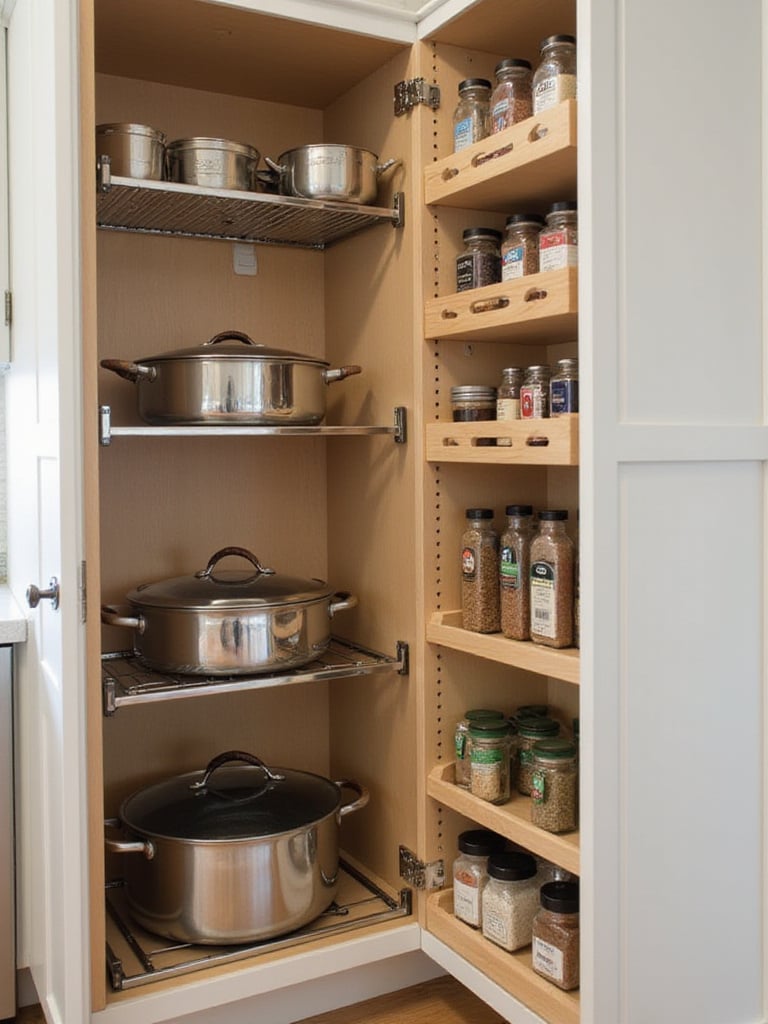
Solid wood, durable metal (chrome-plated or stainless steel), high-quality BPA-free plastics, and powder-coated finishes are signs of quality. Avoid flimsy plastics, thin metals, or unsealed wood. Before purchasing organizers, measure the interior dimensions of your cabinets carefully to ensure a proper fit.
The crucial element is balancing quality with purpose. Not every kitchen cabinet storage solution needs to be top-of-the-line, but investing in quality for frequently used items creates a more harmonious kitchen experience with less frustration and waste over time.
Congratulations! You’ve implemented genius storage solutions and transformed your kitchen cabinets. But the journey to a continuously organized kitchen doesn’t end there. Regular reassessment and refinement are key to maintaining your system and preventing clutter from creeping back in.
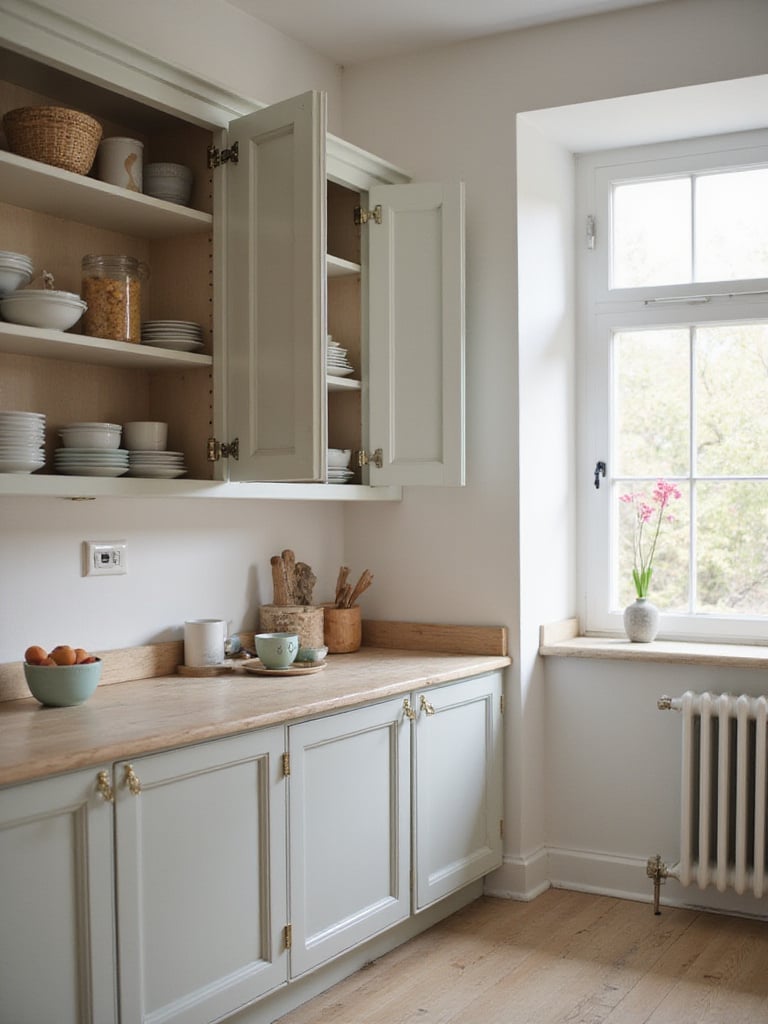
Kitchen needs and usage patterns change over time. Reassessing allows you to adapt your system to these changes, preventing clutter and ensuring continued efficiency. Aim for reassessment at least twice a year during seasonal cleaning, with more frequent mini-assessments (monthly or quarterly) as needed.
I can sense your skepticism about maintaining yet another system, but here’s the truth: when you create kitchen cabinet storage solutions that truly work with your cooking style, maintenance becomes less of a chore and more of a brief check-in with your space. It becomes part of your mindful kitchen practice.
Transforming your kitchen cabinets from chaotic to organized is more than just a practical improvement—it’s a step toward creating a mindful cooking sanctuary. By implementing these 19 kitchen cabinet storage solutions, you can maximize space, minimize frustration, and create a kitchen that supports your cooking practice on both practical and spiritual levels.
Remember, the key is to start with decluttering, plan your zones thoughtfully, utilize vertical space creatively, and label everything clearly. Don’t be afraid to get creative with DIY solutions or invest in quality organizers where it matters most. And most importantly, recognize that maintaining an organized kitchen is an ongoing practice of mindfulness and refinement.
Your kitchen is where nourishment begins—both for your body and your spirit. When your kitchen cabinet storage is thoughtfully organized, cooking becomes less of a chore and more of a mindful practice. So take the plunge, implement these ideas, and transform your kitchen into the sacred space it deserves to be.